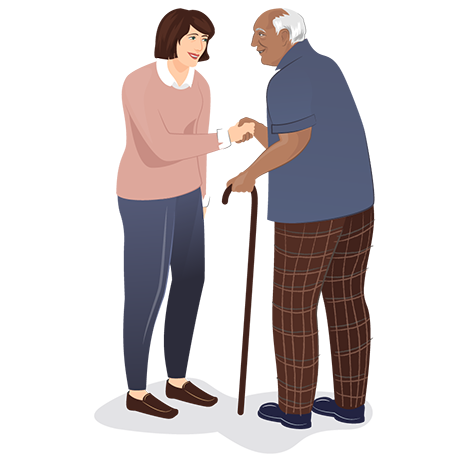
A Guide to Domiciliary Care



Speak to one of our experts
Our friendly experts are here to help from 9am to 7pm, 7 days a week.
What is domiciliary care?
Domiciliary care is another term to describe care that is provided within an elderly person’s home. The terminology within care can sometimes be confusing. The word domiciliary comes from the Latin word ‘Domus’ meaning ‘home’. By having care at home, families can try to eliminate the disruption of moving an elderly loved one out of their home. It is a popular form of care for this reason, and for many elderly people who would prefer to stay in their homes, domiciliary care provides the perfect solution.
For more information on how live in care for the elderly works, read our guide: What is Live in Care?

What does domiciliary care mean?
There are various options when receiving domiciliary care, dependent on the person’s specific needs. This could relate to the prompting of medicines or personal care such as dressing, bathing, and toileting. The idea is to help someone to remain in their own home so that there is minimal disruption to their usual routine. Many individuals who need care still want to retain their quality of life and independence, which is made more possible if they remain in their own home rather than move to a residential home.
What is domiciliary care in the UK?
Domiciliary care services for the elderly refer to any situation where a carer for the elderly visits a client in their own homes. The definition of domiciliary care is the same across the UK. However, the level of funding that you can access from your local authority will differ depending on your location. The Money Advice Service is a reliable resource of advice1.
What services do domiciliary carers provide?
Domiciliary carers can help with numerous different tasks and care duties.Since the exact elderly care needs will be dependent on the person’s individual needs, these duties will look different in every case. At the heart of a domiciliary carer’s service is the focus on trying to ensure that the person requiring care is assisted with their day-to-day living needs, in such a way that they can continue to live as independently as possible in their own home. Some of the duties that a domiciliary carer may help with are as follows:
- Personal care

- Help with mobility
- Dressing
- Cooking and feeding
- Keeping the home clean and tidy
- Laundry and other household tasks
- Medication management
- Applying lotions and creams
- Toileting, including catheter care
- Grooming, including hair care and shaving
- Bathing and showering
- Shopping
- The skills of the care worker, which should be appropriate for the level of care required
- The budget available to the client
- In the case of private care agencies or self-employed care workers – a fee will need to be agreed
- The time agreed (in the case of private care agencies)
Who needs domiciliary care?
What is the Code of Conduct for domiciliary care workers?
Each domiciliary care worker is bound by a Code of Conduct that ensures protection for individuals being cared for. According to Skills for Care, funded by the Department of Health, Healthcare Support Workers and Adult Social Care Workers in England must abide by the following Code of Conduct:
- Be accountable by making sure you can answer for your actions or omissions.
- Promote and uphold the privacy, dignity, rights, health, and wellbeing of people who use health and care services and their carers at all times.
- Work in collaboration with your colleagues to ensure the delivery of high quality, safe and compassionate healthcare, care, and support.
- Communicate in an open, and effective way to promote the health, safety, and wellbeing of people who use health and care services and their carers.
- Respect a person’s right to confidentiality.
- Strive to improve the quality of healthcare, care, and support through continuing professional development.
- Uphold and promote equality, diversity, and inclusion.
You can read the full Code of Conduct here.
For agency workers or self-employed domiciliary carers, ask to see their relevant Code of Conduct or guidelines contained within their contract before appointing them.
What is a domiciliary care agency?
 A domiciliary care agency is an organisation that supplies carers to people who require in-home care. The organisation will usually try to provide bespoke carers who are most appropriate to support the needs of the person requiring the care. Agencies can arrange the dates and times of their visits, taking the responsibility for such duties away from you.
A domiciliary care agency is an organisation that supplies carers to people who require in-home care. The organisation will usually try to provide bespoke carers who are most appropriate to support the needs of the person requiring the care. Agencies can arrange the dates and times of their visits, taking the responsibility for such duties away from you.
In the private sector, Domiciliary Care Agencies may directly employ the carers. Within Local Authorities, they may either directly employ the carers or contract the work to agency staff. In the case of The Live in Care Company, our carers are self-employed, which means that they can set their own working hours appropriate to their client’s needs.
What is a domiciliary care allowance?
Carer’s Allowance: You might meet the criteria for Carer’s Allowance if you are providing over 35 hours a week of care to someone with a disability
- Local Authority Funding
- Self-Funding
- Care Annuity
- Long Term Care Insurance
- Rental Income
- Equity Release
- Deferred Payment Scheme with your local council
- Income from Investments
- Savings
- Pension
- NHS Continued Healthcare Funding
- Third-Party Top-Ups
Is domiciliary care for me?
Domiciliary care for the elderly works especially well for people who wish to remain in their own home and for families that want to support their loved one to remain in their own home – whether they are living with ill-health, a degenerative illness, or an age-related illness. For most people requiring care, their preference is to remain in their own home and within the community, they are familiar with, as it helps them to keep links with friends and family that are vital for their wellbeing.- Calling 0118 449 2373
- Filling in our contact form
- Emailing hello@theliveincarecompany.co.uk






